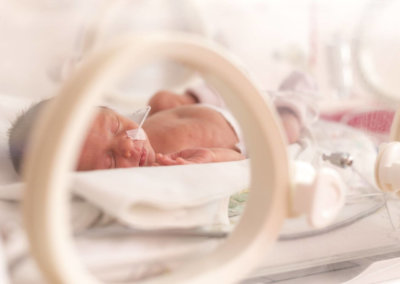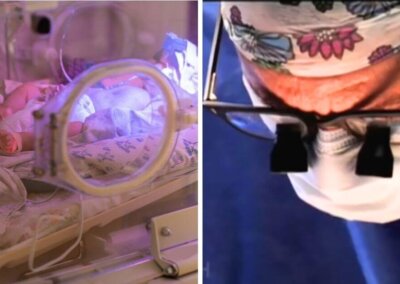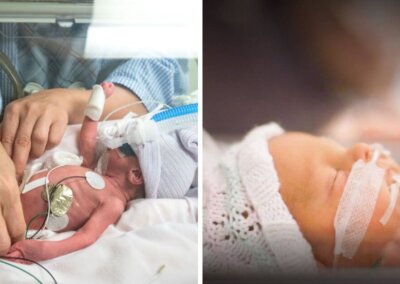Baby Oscar was born at only 26 weeks gestation. After spending four months in a neonatal intensive care unit with only a 50% chance of survival, he is now a thriving one-year-old.
Oscar Dunn was born to Carly and Mark at James Cook University Hospital in Middlesbrough weighing less than 2lbs. During what appeared to be a normal pregnancy, his mother Carly was found to be suffering from severe pre-eclampsia and high blood pressure when she was 24 weeks pregnant.
Carly became concerned when she could no longer feel her baby moving and she remained under close monitoring at Sunderland Royal Hospital for the next two weeks. After a scan showed that the blood flow to the umbilical cord had become severely restricted and as there were no neonatal beds available in Sunderland, she was rushed to James Cook University Hospital where she underwent an emergency Cesarean section.
When Oscar was born on 9 June 2020, he was unable to breathe on his own and had to be put on a ventilator. His parents could only visit him for two hours a day because of COVID-19 lockdown restrictions. His mum, Carly, said:
“I think a lot of people don’t realise that there’s this little community called the NICU. People think that pregnancy is pregnancy and at the end of it you have a lovely, healthy little baby, but for us, that wasn’t the case”.
“I knew I needed to ask, ‘how bad is it?’”
But they weren’t out of the woods yet. Carly and Mark knew that something was seriously wrong when the two of them were invited to come to the hospital early and so were Oscar’s grandparents, who, up until this point, had not been allowed to see him.
Carly said: “We both had an idea what was going on, but we were too scared to ask the question, ‘how bad is it?'”
Mark added: “I knew I needed to ask, ‘how bad is it?’
“I asked [and the consultant] replied, ‘It’s very bad, we have got you a flat just next to the unit and you can invite the grandparents to see him.
“‘The next few hours will be make or break but we will do our best.'”
In the end, the doctors had to hand ventilate Oscar throughout the night, and thanks to their efforts, Oscar has just celebrated his first birthday.
Oscar’s mum said: “Oscar is a little fighter, he’s so strong. He’s so lovely and he’s doing all the things that he should be doing for his age now.
“He’s so cheeky and he’s got such a lovely personality. He was known as ‘the feisty one’ at James Cook because all the nurses used to keep diaries on the babies in the NICU.
“They would write what the baby has been up to and every time we read it the nurses would have written ‘Oscar’s been feisty again today and trying to pull his tubes out.'”
Survival rates for babies born before the abortion limit are increasing
Babies are continuing to be born before or shortly after the abortion limit in Great Britain of 24 weeks gestation and going on to live and even thrive at greater rates than before. Studies suggest that the majority of premature babies grow up to be healthy adults without any major health problems.
A study, published in the Journal of the American Medical Association in October 2019, followed 2.56 million babies born in Sweden between 1973 and 1997, around six percent of whom were born prematurely.
Researchers compared the health data of premature babies to those that had been born at full term. They found that 55% of premature babies had no serious chronic, physical, or mental health issues by early adulthood. This is compared to 63% for babies born at full term.
Additionally, with each passing decade, the odds of survival for a premature baby to adulthood have improved from about 91% of babies born in the 1970s to about 96% of those born in the 1990s.
Right To Life UK spokesperson, Catherine Robinson, said: “The marvel of modern medicine enables babies like Oscar to survive despite the fact that they are born so prematurely. Modern medicine also increasingly shines a light on the barbarity of abortion. As babies survive when they are born before or just after the abortion limit in the UK and as technology increasingly gives us a window into the womb, the humanity of these children becomes harder and harder to deny.”












